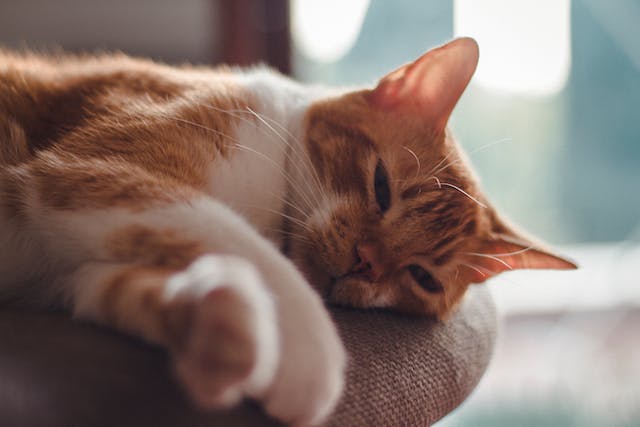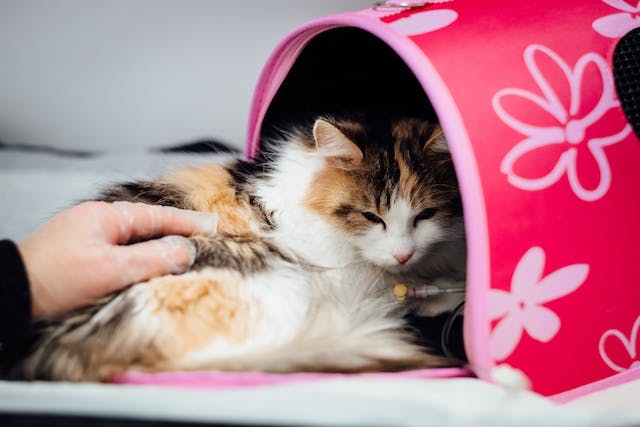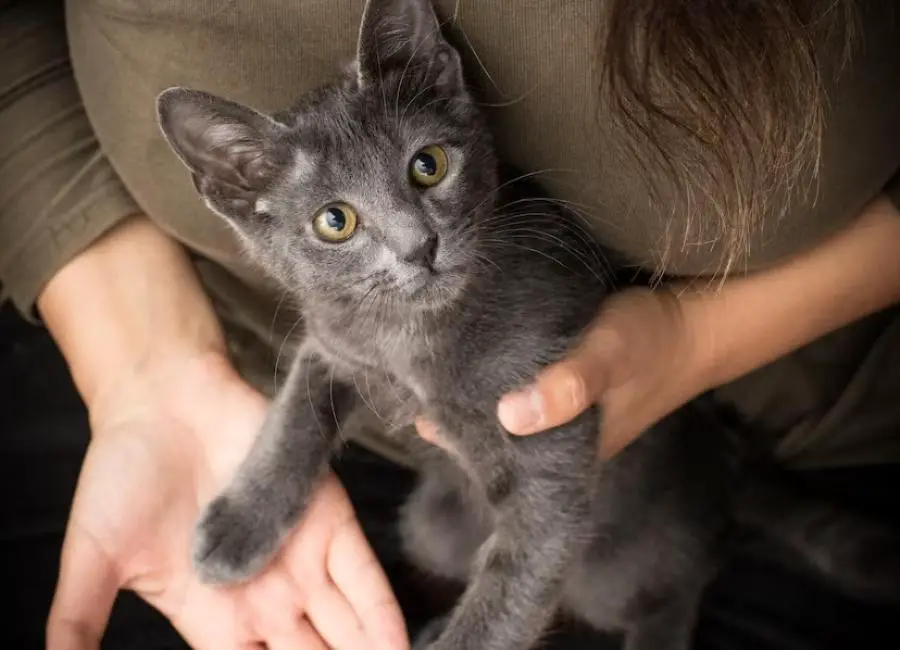Let’s discuss cats behavior after neutering and what you should know…
Have you ever wondered how your furry friend’s behavior might change after getting neutered? Well, fret not, because today we’re diving into the fascinating world of cat behavior post-neutering.
Buckle up and get ready to discover the ins and outs of your cat’s spay/neuter journey and how it can impact their purrfect little personalities!
What is Cat Neutering?
Cat neutering is a surgical procedure performed by a veterinarian to remove the reproductive organs of a cat, specifically the ovaries in females and the testes in males.
Neutering is commonly done to prevent unwanted pregnancies, reduce the risk of certain health issues, and control cat populations. It is a routine procedure that is safe and beneficial for cats.
Advantages of Neutering for Cats

Neutering, or spaying for female cats, offers several health benefits. Firstly, it eliminates the risk of uterine infections and reduces the chances of mammary gland tumors.
Secondly, neutering can help prevent the development of testicular cancer in male cats. Thirdly, it reduces the urge to roam, minimizing the risk of injury and exposure to infectious diseases.
Fourthly, neutering can help prevent aggressive behaviors and reduce the likelihood of spraying or marking territory.
Lastly, it helps control the pet population, reducing the number of homeless cats and the strain on animal shelters.
Cats Behavior After Neutering
After neutering, cats may experience changes in their behavior. They may become less aggressive and less prone to roaming or marking territory.
Neutered cats are often more affectionate and tend to display fewer territorial behaviors.
They may also have a reduced desire to fight with other cats. Overall, neutering can have a positive impact on a cat’s behavior, promoting a calmer and more contented disposition.
Let’s dive deeper…
The following are some of the most common cats behavior after neutering:
1. Reduced Aggression
Neutering plays a crucial role in reducing aggression in cats, particularly in males. Before neutering, unneutered males often exhibit aggressive behavior, including fighting with other males over territory and mating rights. This aggressive behavior can lead to injuries and stress for your cat.
After neutering, the decrease in testosterone levels results in a calmer disposition. Neutered males are less likely to engage in territorial disputes and are generally more sociable with other cats and even humans. This can create a more peaceful and harmonious environment in your home.
2. Decreased Roaming
Unneutered male cats have a strong drive to roam in search of females in heat. This behavior is not only stressful for the cat but also dangerous. They are at risk of getting into fights, being hit by cars, or getting lost.
Neutering significantly reduces the urge to roam as the hormonal drive to find a mate diminishes. This change in behavior ensures your cat’s safety and helps keep them close to home.
3. Less Spraying
One of the most significant benefits of neutering is a reduction in urine spraying, a common behavior in unneutered males and even some females. Spraying is a way for cats to mark their territory and communicate with other cats.
Neutering reduces the production of certain hormones, making your cat less inclined to mark their territory in this way. This means you’re less likely to find those pungent marks around your house, resulting in a more pleasant living space.
4. Weight Management
Neutered cats may experience changes in their metabolism, making them prone to weight gain. Hormonal alterations can slow down their metabolism, and they might have a reduced desire to roam and exercise.
To address this, it’s crucial to monitor their diet and encourage regular physical activity. Maintaining a healthy weight is essential for your cat’s overall health and well-being.
5. Calmer Demeanor
After neutering, many cats exhibit a more relaxed and easygoing temperament. With the removal of hormonal urges, they are less driven by the need to mate.
This often translates into a cat that is more content, less anxious, and less inclined to engage in territorial or aggressive behaviors. Neutered cats tend to be more affectionate and enjoy human companionship, making them wonderful companions.
6. Altered Vocalization
Unneutered male cats can be quite vocal, especially when they are seeking a mate. Their yowling and constant meowing can be disruptive, both to their owners and neighbors.
Neutering typically results in a reduction in these vocalizations. Your cat is likely to become quieter, which can lead to a more peaceful and quieter household.
Cat Behavior Immediately After Neutering

Immediately after neutering, cats may experience grogginess and disorientation due to the effects of anesthesia.
They may exhibit decreased activity levels and appear lethargic for a short period. Cats may also display temporary changes in appetite and thirst.
It is common for cats to groom the surgical site excessively or exhibit increased sensitivity in that area.
However, these behaviors typically resolve within a few days as the cat recovers from the surgery.
Challenges and Concerns With Cat Neutering
Cat neutering, also known as spaying or castration, is a common procedure performed to control the cat population and provide health benefits. However, there are some challenges and concerns associated with this practice.
One challenge is the cost of neutering, as it can be expensive for some pet owners. Additionally, there can be risks associated with anesthesia and surgical complications. Another concern is the potential for behavioral changes post-neutering, such as weight gain or aggression.
Lastly, there may be cultural or personal beliefs that oppose altering an animal’s reproductive abilities.
Overall, while cat neutering has numerous benefits, it is important to consider these challenges and concerns before proceeding with the procedure.
Tips for Cat Post-Neutering Care

After the surgery, it is important to provide proper care to ensure a smooth recovery for your cat.
Here are some tips for cat post-neutering care:
1. Monitor your cat: Keep a close eye on your cat during the recovery period. Watch for any signs of complications such as excessive bleeding, swelling, or discharge from the incision site. If you notice anything concerning, contact your veterinarian immediately.
2. Provide a quiet and comfortable space: Create a quiet and comfortable space for your cat to rest and recover. Set up a cozy bed or a quiet room where your cat can relax without being disturbed.
3. Limit physical activity: Restrict your cat’s physical activity during the recovery period. Avoid letting them jump or climb on furniture, as this can strain the incision site. Provide low-impact activities and toys to keep them entertained without exerting themselves.
4. Prevent licking or chewing: It is important to prevent your cat from licking or chewing the incision site, as this can lead to infection or delayed healing. Use an Elizabethan collar (cone) or a recovery suit to prevent access to the incision area.
5. Follow post-operative instructions: Follow the post-operative instructions provided by your veterinarian. This may include administering any prescribed medications, keeping the incision site clean, and monitoring for any changes in behavior or appetite.
6. Monitor food and water intake: Keep an eye on your cat’s food and water intake. If your cat is not eating or drinking normally after the surgery, contact your veterinarian for guidance. It is important to ensure that your cat stays hydrated and receives proper nutrition during the recovery period.
7. Schedule a follow-up appointment: Schedule a follow-up appointment with your veterinarian to ensure that your cat is healing properly. The veterinarian will examine the incision site and address any concerns or questions you may have.
Remember, every cat is unique, and the recovery process may vary. If you have any specific concerns or questions about your cat’s post-neutering care, it is always best to consult with your veterinarian for personalized advice and guidance.
Frequently Asked Questions
Will my cat’s behavior change after neutering?
Yes, your cat’s behavior may change after neutering. Male cats may become less aggressive and less likely to roam. Female cats may become less territorial and less prone to yowling or spraying. However, every cat is unique, and individual behavior changes may vary.
Will my cat gain weight after being neutered?
Neutering can sometimes lead to weight gain in cats. After the procedure, cats may experience a decrease in their metabolism, which can make them more prone to weight gain. To prevent this, it’s important to provide a balanced diet and engage your cat in regular exercise.
How long does it take for a cat’s behavior to change after neutering?
The behavioral changes in cats after neutering can vary. Some cats may show immediate changes, while others may take a few weeks for their behavior to adjust. It’s important to be patient and give your cat time to adapt to the new hormonal changes.
Will my cat’s personality change after being neutered?
Neutering generally does not alter a cat’s personality. However, it can help reduce certain behavioral traits driven by hormones, such as aggression or territorial marking. Your cat’s unique personality will mostly remain the same, but you may notice positive changes in certain behaviors.
Should I expect my cat to be in pain after neutering?
It is normal for cats to experience some discomfort after neutering, but they are usually given pain medication during and after the procedure to help manage any discomfort. If you notice excessive pain or any unusual behavior, it’s best to consult your veterinarian for guidance.
Will neutering eliminate all behavioral issues in my cat?
Neutering can help reduce certain behavioral issues, such as aggression, roaming, and spraying. However, it may not completely eliminate all behavioral problems. If your cat continues to exhibit problematic behaviors, it’s important to consult with a veterinarian or a professional animal behaviorist for further guidance and training options.
Conclusion
In conclusion, neutering your cat can have a positive impact on their behavior. By reducing hormone-driven behaviors like spraying and aggression, your feline friend can experience a calmer and more contented life. So, consider this responsible choice for your cat’s well-being and enjoy the benefits of a happier, harmonious household.


